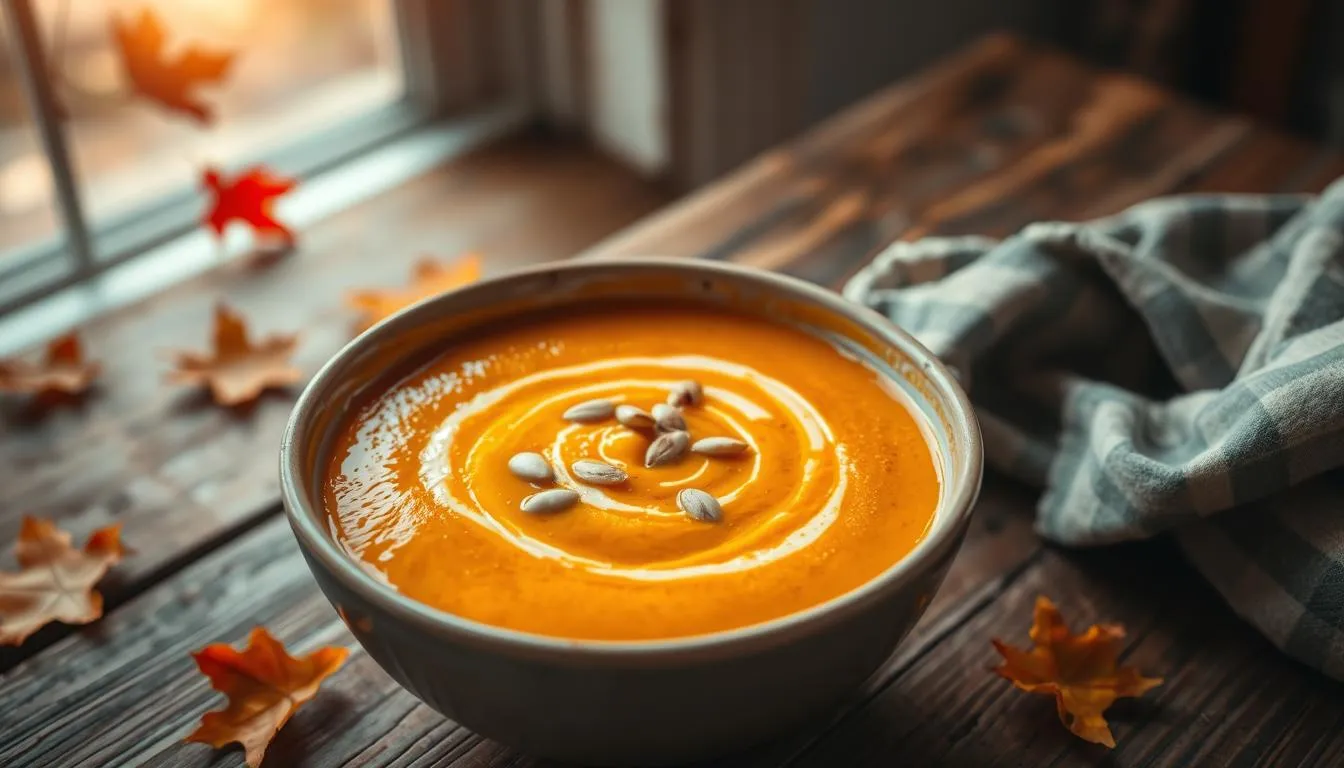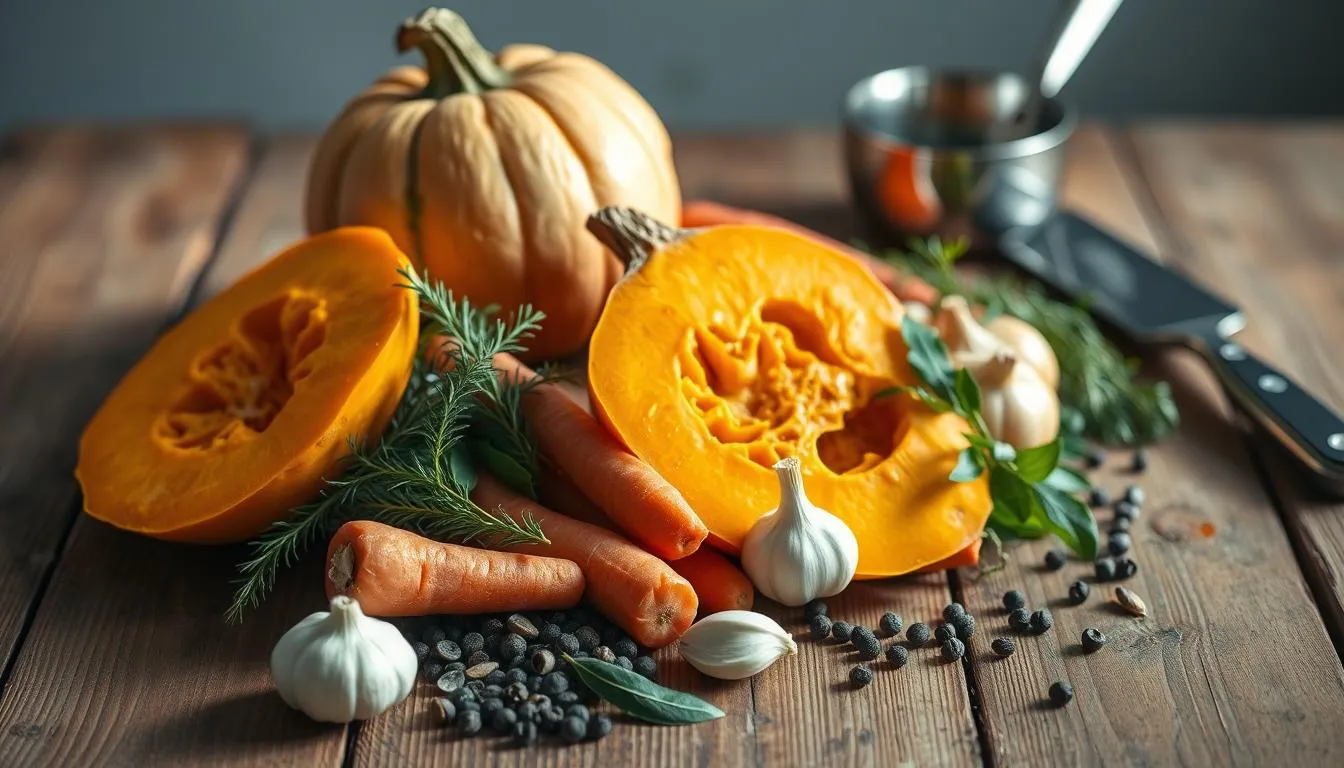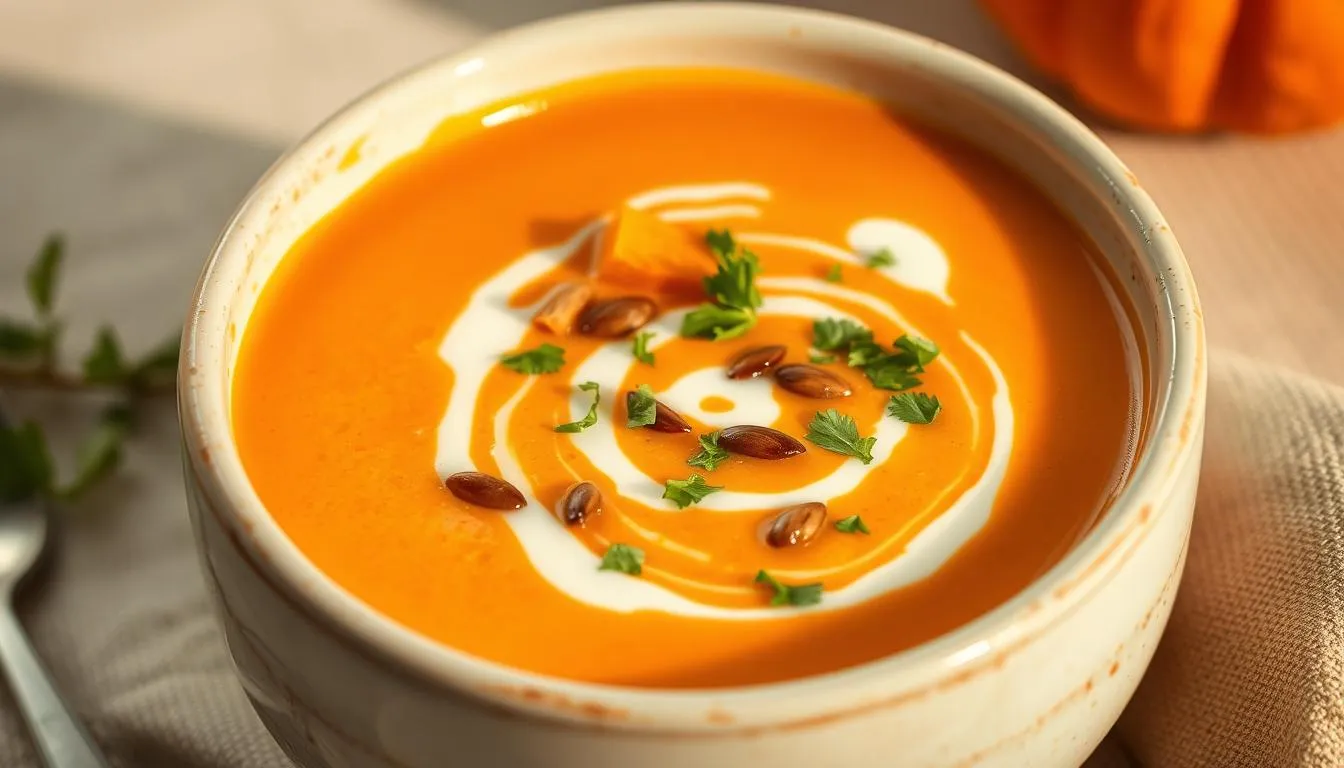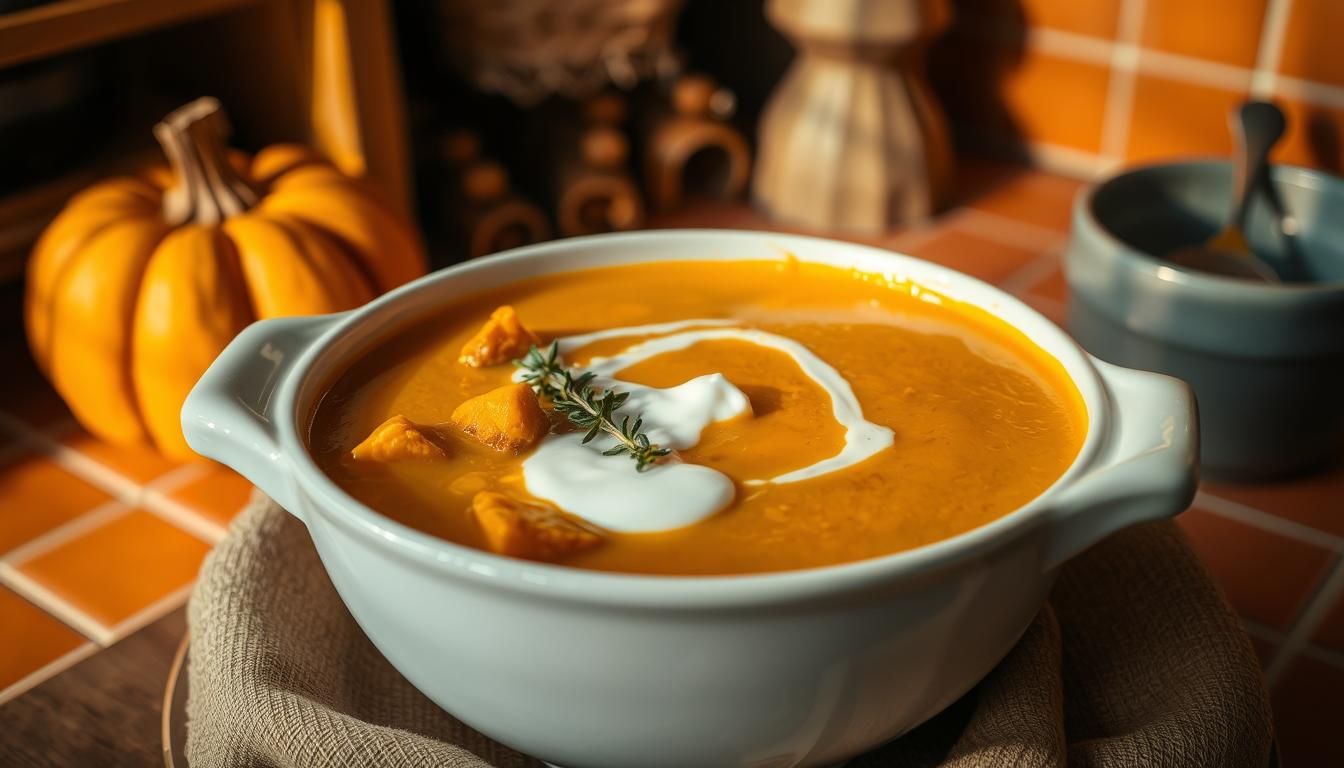There are moments when a single bowl can feel like a warm hug. I still remember the first chilly night I learned to coax pure, clean flavor from roasted squash and sweet onion. That comfort gentle, familiar, and honest is what this dish brings.
This guide walks you through a cozy, easy approach that highlights the natural richness of pumpkin without hiding it under heavy additions. Youll see how a few smart ingredients and a quick stovetop simmer make thick, velvety results straight from the pot.
We cover simple tools like a blender, tips for adding cream or keeping it dairy-free, and serving ideas that make extra bowls feel special. Expect clear steps for stovetop or roasted methods, plus storage notes so leftovers taste just as good later.
Key Takeaways
- Focus on the pumpkins natural flavor, boosted by onion and garlic.
- Two easy methods: quick stovetop and deeper roasted for richer taste.
- Use a blender for silky texture; add cream at the end to adjust richness.
- Serve in warm bowls with crusty bread for a cozy fall meal.
- Refrigerate 45 days or freeze up to 3 months; thin when reheating if needed.
Why this cozy fall soup works right now
This fall favorite proves deep flavor doesnt require fuss or hours at the stove.
Simple aromaticsonion and garlicgive savory backbone. A good broth rounds the base so the pumpkin tastes rich and layered with minimal effort.
The quick simmer method saves time; you can go from stovetop to table in just minutes on busy nights. Peel the skin before cooking so the pure stays silky and smooth.
Choose sugar pie pumpkins or butternut squash for best results. Skip carving varieties; they lack the sweet, dense flesh you want.

A pinch of pepper and a touch of maple syrup can lift the natural sweetness without hiding it.
Finish with milk or cream for classic richness, or use coconut milk for a dairy-free, lush option. This balance of ease and taste makes the dish ideal for everyday dinners and small fall gatherings.
| Variety | Flavor | Best Use | Notes |
|---|---|---|---|
| Sugar pie | Sweet, dense | Puree or roasted | Small, flavorful; ideal for creamy bowls |
| Butternut squash | Nutty, smooth | Roast or stovetop | Consistent texture, easy to peel |
| Carving pumpkin | Watery, bland | Not recommended | Skip for best flavor |
Ingredients and tools youll need for creamy pumpkin soup
A smooth, flavorful bowl begins with smart ingredient choices and the right pot or blender on hand.
Best squash and flesh choices
Pick sweet options like sugar pie pumpkin or butternut squash for reliable texture and flavor. Use roasted pumpkin for deeper, caramelized notes; roast at about 425F for 35 minutes until tender. Discard the skin before blending so the pure stays silky.
Aromatics and flavor builders
Start with diced onion and minced garlic sauted in a little oil. Add low-sodium vegetable or chicken broth and a measured pinch of salt and pepper to make the base round and savory.
Creamy add-ins and warm accents
Finish with milk, heavy cream, half-and-half, or coconut milk depending on diet and preference. For cozy warmth, stir in a bit of cinnamon, nutmeg, and a touch of ground cloves. A splash of maple syrup balances sweetness add slowly and taste.
Helpful equipment
Use a large pot or Dutch oven for even heat. Blend once the flesh is soft with an immersion blender or transfer in batches to a stand blender for an ultra-smooth result. If using fresh squash, allow enough minutes in a hot oven so the flesh concentrates its flavor.

A little butter or toasted seeds on top adds contrast to a creamy bowl.
Pumpkin soup recipe: step-by-step guide
Choose the path that fits your time and taste. A quick stovetop method gets dinner ready fast, while roasting deepens sweetness and adds caramelized notes.
Prep the squash
Peel, remove the skin, and cube fresh squash or open canned pure for speed. If roasting, cut into quarters, place cut-side down, and roast at 425F until fork-tender, about 35 minutes, then scoop out the flesh.
Quick one-pot stovetop
In a pot, combine peeled cubes, chopped onion, minced garlic, and vegetable broth. Bring to a lively simmer and cook 1015 minutes until very tender. This method saves time and keeps cleanup simple.
Roasted method for deeper flavor
Saut onion and garlic in oil with a pinch of ground spices. Add roasted flesh and a cup of broth, then simmer briefly so the flavors meld without overcooking.

Blend safely and finish
Use an immersion blender directly in the pot, or let the batch cool slightly and transfer in small amounts to a stand blender. Vent the lid and cover with a towel.
Taste and season with salt and pepper, then finish with milk, half-and-half, cream, or coconut milk. Keep the heat gentle after adding dairy to avoid splitting. Adjust thickness with extra broth or simmer longer to reduce. A light drizzle of maple balances savory bowls.
For detailed proportions and a classic baseline, see this classic pumpkin soup.
Flavor variations to change it up
Try a handful of simple additions to change the bowls character without extra fuss.
Curried twist: Blend the base until smooth, then stir in a bit of curry powder. Taste as you go so the spice supports the pumpkin and does not overpower it.
Thai red curry: Saut red curry paste in a little oil until fragrant, add broth and pumpkin, simmer, and finish with coconut milk or coconut cream for a rich, silky finish.
Light spice blends: Try ground cumin, coriander, and smoked paprika, or go golden with turmeric plus a tiny pinch of cayenne for warmth. These lift the flavor without extra work.
Ginger and garlic: Saut fresh ginger with garlic and onion before adding liquids to deepen savoriness. A splash of maple syrup or honey balances the savory edge.
Toast pepitas in a skillet over gentle heat until they pop and smell nutty; scatter them on top for crunch and contrast.
Finish options: Swap in butternut squash or roasted pumpkin if you prefer. For extra richness, swirl in milk, cream, or heavy cream and, if you like, give the pot one quick whirl in the blender after mix-ins.
Toppings, sides, and serving ideas
A handful of finishing touches give the dish contrast, color, and crunch. These small additions make each bowl feel intentional and cozy without extra fuss.
Drizzles and swirls: Elevate each bowl with a simple swirl of cream, a spoonful of coconut milk, or a ribbon of olive oil for shine and mouthfeel.
- Crunch: Toast seeds like pepitas in a dry skillet until they pop and turn golden, then sprinkle on top for bright texture.
- Finish: Add freshly ground pepper and tender herbs such as parsley or chives to brighten aroma and color.
- Sweet counterpoint: A careful thread of maple or a tiny spoon of maple syrup echoes the squashs natural sweetness without overpowering.
- Serve warm: Ladle into warmed bowls and keep the pot on the lowest setting so seconds stay silky and steamy.
- Sides: Pair with crusty bread, garlic toast, or a crisp salad for a balanced plate that feels complete.
- Final blitz: For an ultra-smooth pourable finish, give the batch one last pass in the blender before ladling; then divide a measured cup of garnish among bowls for a neat presentation.
Keep garnishes simple and consistent across the table so every serving looks intentional and restaurant-worthy.
Make-ahead, storage, and reheating tips
Plan ahead once and enjoy warm bowls all week with minimal fuss.
Refrigerate or freeze: Cool fully, then seal in airtight containers. Refrigerate for 45 days or freeze portions for up to 3 months. Label cups or bags with the date so you use older portions first.
Reheat gently: Thaw overnight in the fridge when possible. Warm over low heat in a pot, stirring every few minutes to prevent sticking. Add a splash of broth or water if the mix needs loosening.
Fixing texture: If the bowl is too thin after thawing, simmer a few minutes to reduce and concentrate flavor. If too thick, thin with warm broth or water in measured cups until it feels right.
- After adding cream or coconut milk, keep heat low to avoid splittingdo not boil.
- Toast seeds and store them separately so they stay crisp at serving.
- Use an immersion blender or transfer to a blender for a quick pass if the texture separates in the fridge.
Stretch one cooking session into several meals by portioning and labelingthis saves time and makes weeknight meals effortless.
| Action | When | Tip |
|---|---|---|
| Refrigerate | 45 days | Cool fully, store in airtight containers |
| Freeze | Up to 3 months | Portion into cups or bags; label with date |
| Reheat | Low heat | Use a pot, stir often, add broth if needed |
| Texture fix | During reheating | Simmer to thicken or add warm broth to thin |
Conclusion
Little stepssaut, simmer, blendadd up to a smooth, flavorful fall classic.
You now have a dependable pumpkin soup recipe thats flexible, quick, and cozy. Cook the squash with onion, garlic, and broth, then blend safely using an immersion tool or a stand blender. Finish with milk, half-and, cream, or coconut for your preferred richness.
Brighten the bowl with a pinch of pepper and a touch of maple syrup if needed. Toasted seeds add crunch and contrast, and a warm loaf of crusty bread makes every serving feel complete.
Batch-cook for busy nights: refrigerate 45 days or freeze up to 3 months. Try roasted or spiced variations when you have extra time so this autumn favorite stays exciting across many meals.
FAQ
What type of squash or pumpkin is best for a creamy fall pot?
Use sugar pie pumpkins, roasted pumpkin, or butternut squash for the best texture and flavor. These varieties have dense, sweet flesh that blends smoothly and keeps the dish naturally rich without needing much added sugar.
Can I swap dairy for a nondairy option without losing creaminess?
Yes. Fullfat coconut milk makes a silky, dairyfree finish. You can also use almond or oat milk with a splash of coconut cream or a little extra butter or oil to mimic richness.
Is it better to roast the squash first or cook it directly in the pot?
Roasting deepens flavor and adds caramel notes, but a quick stovetop method saves time and still yields a tasty bowl. Choose roasting for depth, stovetop for speed.
How do I safely blend hot squash without making a mess?
Use an immersion blender directly in the pot for the safest, easiest option. If using a stand blender, cool slightly, fill jars halfway, and vent the lid with a towel to avoid pressure buildup.
Whats the best way to season so it doesnt taste flat?
Build layers of flavor: saut onion and garlic first, add broth and spices like nutmeg or cloves, then finish with salt, pepper, and a touch of maple syrup or a squeeze of lemon to brighten the bowl.
Can I make this ahead and how should I store it?
Yes. Refrigerate in an airtight container for up to 4 days or freeze for 23 months. Thaw overnight in the fridge, then reheat gently on low, adding a splash of broth or water if too thick.
How do I fix texture problems if the puree is too thin or too thick?
If too thin, simmer uncovered to reduce and concentrate. If too thick, whisk in warm broth, milk, or cream a little at a time until you reach the desired consistency.
What toppings and sides work best with this fall bowl?
Drizzle with heavy cream, coconut milk, or olive oil and finish with toasted pepitas, freshly ground pepper, chopped herbs, or a spoonful of Greek yogurt. Serve with crusty bread or a simple green salad.
Can I add protein like chicken broth or ground spices to make it heartier?
Using chicken broth instead of vegetable broth adds savory depth, and stirring in cooked, shredded chicken or crispy bacon pieces makes the meal more substantial. Ground spices like cumin or smoked paprika also boost savory notes.
Any quick tips for elevating flavor with pantry staples?
Stir in a little maple syrup for subtle sweetness, a pinch of cinnamon or nutmeg for warmth, and finish with a squeeze of lemon or apple cider vinegar to brighten the overall flavor.
